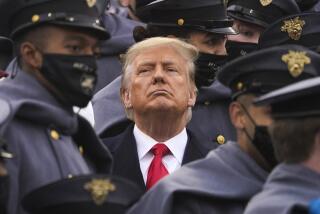Vietnam Ghost Haunts Senate
- Share via
WASHINGTON — In the rush to approve a resolution giving President Bush full authority to retaliate for Tuesday’s attacks on the World Trade Center and the Pentagon, a few lawmakers worried about going a bit too far.
Off the Senate floor, the words they spoke were: “Gulf of Tonkin Resolution.” In 1964, just three days after a reported attack on U.S. patrol boats near the coast of Vietnam, Congress passed a resolution giving President Lyndon B. Johnson the authority to use “all necessary measures” to “prevent further aggression” in Southeast Asia. The measure won approval, 416-0 in the House and 88-2 in the Senate.
It set no limits on what the president could do, where he could use force or for how long. Years later, after the war in Vietnam stalemated, many lawmakers came to regret their vote for such an open-ended authorization.
Friday, Congress responded not to distant reports involving a few ships, but to a deadly attack on American soil. However, the resolution it passed uses similarly broad wording.
It empowers Bush to “use all necessary and appropriate force against those nations, organizations or persons” behind the attacks. He also can take military action to “prevent any future acts of international terrorism against the United States by such nations, organizations or persons.” It passed on a 98-0 vote in the Senate and 420-1 in the House.
Sens. John McCain (R-Ariz.) and John F. Kerry (D-Mass.), both Vietnam War veterans, were among those who expressed concern about an open-ended authorization to use military force.
Initially, White House aides had asked for an even broader authority to “deter and prevent any related future acts of terrorism.”
McCain and Kerry say they narrowed the resolution by focusing it as a response to the Tuesday attacks, rather than making it a blank check to go after all terrorists everywhere.
“We had some negotiations, and by including the Sept. 11 date, we pretty well resolved most of the concerns,” McCain said. “But obviously, I have some concerns” about the Gulf of Tonkin precedent, he added.
Does the president now have the authority, for example, to order a full invasion of Afghanistan?
“Technically, yes,” McCain replied. “He can do almost anything. It would allow the use of ground troops under certain circumstances.
“I think this will require a long, sustained effort,” McCain said. “But no one is envisioning occupying a country. Afghanistan is one of the most rugged, remote countries in the world. If they go for an invasion, they should come back to Congress again.”
After the Vietnam era, Congress adopted the War Powers Act to prevent small military operations from escalating into protracted wars. It set a 60-day limit on the president’s use of the military for combat abroad without express approval from lawmakers.
Friday’s joint resolution waives that limit. It describes the authorization given to Bush as the express approval for combat required by the War Powers Act.
A congressional legal advisor described the resolution as giving the president virtually a free hand to use force.
“It’s difficult to see what the limits are,” he said.
The senators spent several days haggling in private over the resolution. They did not hold a floor debate, however. It was passed after a somber roll call Friday morning.
It was not the time to “quibble” or “argue the legalisms,” said Senate Minority Leader Trent Lott (R-Miss.)
Kerry also issued a statement saying he was satisfied with the final wording. “We have given the president the authority that he needs to respond to this unprecedented attack on American citizens on U.S. soil. It is not an open-ended authorization to use force in circumstances beyond those we face today,” he said.
Several experts on international law said the resolution puts few limits on the president’s authority.
“It’s an improvement over the first version, but it is still quite broad,” said University of Pittsburgh law professor Jules Lobel. “It is not directed against anybody. For example, if the president believes Libya, Iraq, Iran and Pakistan were involved in harboring these terrorists, he could attack all of them.”
Lobel said he also would have preferred a time limit, such as 180 days, for a military response. After that time, Congress could have required the White House to obtain approval for further action, he said.
University of Arizona political scientist David N. Gibbs, an expert on Afghanistan, said he worries about the United States getting involved in a war there.
“It’s one of the most rugged places on Earth. And they are formidable foes,” he said. “We can’t win a definitive victory. It’s easier to imagine us getting bogged down in a disastrous war.”
*
Times staff writer Henry Weinstein in Los Angeles contributed to this report.
More to Read
Get the L.A. Times Politics newsletter
Deeply reported insights into legislation, politics and policy from Sacramento, Washington and beyond. In your inbox twice per week.
You may occasionally receive promotional content from the Los Angeles Times.











